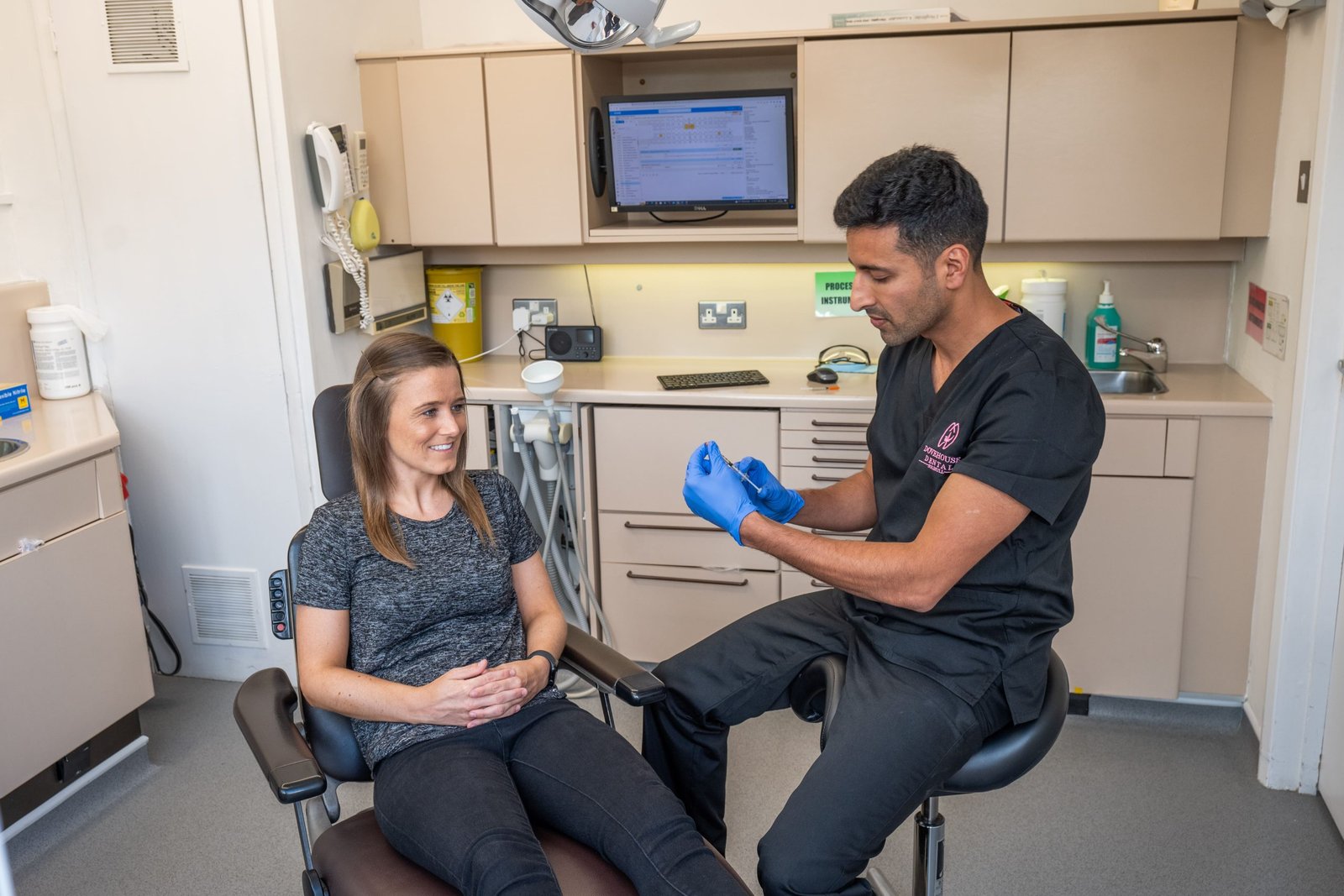Have you ever wondered how long dental implants, a popular tooth replacement option, can last? A dental implant is a permanent solution to tooth loss, lasting between 20 and 30 years!
If you’re experiencing tooth loss and looking for a natural tooth replacement option, dental implants might be the answer for you.
Factors Affecting Dental Implant Longevity
Proper oral hygiene significantly impacts implant lifespan. Maintaining good dental hygiene is crucial for the long-term success of dental implants. Using a soft-bristle toothbrush and non-abrasive toothpaste is essential for maintaining the health and longevity of teeth implants. This gentle approach will prevent any potential damage to the implant surface.
Smoking can negatively affect the success of dental implants. Tobacco use, including smoking cigarettes or chewing tobacco, has been linked to a higher risk of tooth implant failures.
Smoking restricts blood flow, impairs oxygen delivery, and slows down the healing process, which can negatively impact the treatment and success of teeth implants. Smoking increases the likelihood of tooth infection and implant failures, and reduces overall bone density, which may lead to an increased risk of tooth loss and implant root treatment.
Chronic health conditions may influence the longevity of implants. Certain medical conditions such as diabetes or autoimmune disorders can impact the durability of teeth implants. Treatment for these conditions is important to ensure the longevity of the teeth implants. These teeth conditions affect healing processes and immune responses in the body, potentially hindering successful integration between the implant and surrounding tissues during treatment. When considering dental implants, it is important for individuals with chronic health conditions to closely collaborate with their healthcare providers to manage these factors. This collaboration ensures proper treatment for teeth and overall well-being.
The quality and quantity of jawbone play a crucial role in tooth implant durability and treatment. The strength and stability of dental implants rely on sufficient bone support in the jaw, which is crucial for healthy teeth. If there is inadequate bone density or volume in the teeth area where an implant is intended, additional procedures like teeth bone grafting may be necessary before successfully placing a teeth implant. Poor bone quality due to factors like osteoporosis or previous trauma can also impact long-term implant success.
Importance of Oral Hygiene for Dental Implants
Maintaining good oral hygiene is crucial for the long-term success of dental implants. Proper care and attention to oral health can ensure that your dental implants last for a lifetime.
Regular brushing and flossing play a significant role in preventing gum disease around dental implants. Just like natural teeth, implant-supported crowns or bridges can accumulate plaque and bacteria if not cleaned properly. Brushing twice a day with a soft-bristled toothbrush and using dental floss or interdental brushes to clean between the teeth implants are essential steps in maintaining oral hygiene.
In addition to regular brushing and flossing, using an antimicrobial mouthwash can aid in reducing bacterial growth around dental implants. An antimicrobial mouthwash helps kill harmful bacteria that may lead to infection or inflammation around the implant site. Incorporating this into your daily oral care routine can significantly contribute to the overall health of your gums and the longevity of your dental implants.
While personal oral hygiene practices are vital, professional cleanings by a dentist or dental hygienist are equally important for ensuring the longevity of dental implants. Professional cleanings at the implant centre remove plaque buildup around the implant root that cannot be reached through regular brushing and flossing alone. During these cleanings, specialised tools are used to thoroughly clean the surfaces of both natural teeth and implant-supported restorations, promoting optimal gum health.
It is worth noting that maintaining good oral hygiene is not only beneficial for dental implants but also for your overall oral health. Untreated gum disease can affect the supporting tissues around teeth, including the implant root, and compromise the stability of adjacent teeth and even impact other areas such as wisdom teeth. It is important to seek treatment at a reputable implant centre.
One critical factor contributing to successful long-term outcomes with dental implants is osseointegration – the process by which bone integrates with the implant surface. Poor oral hygiene practices can hinder osseointegration by increasing the risk of infection or inflammation at the implant site.
Regular Dental Check-ups for Maintaining Implant Longevity
Regular dental check-ups are crucial for ensuring the longevity of dental implants. These routine visits not only help in maintaining oral health but also allow early detection of any potential issues with the implants.
During these check-ups, dentists thoroughly examine the condition of the surrounding tissues, including gums and bone, to ensure they are healthy and free from infection or inflammation. This assessment is essential as it helps identify any signs of periodontal disease or complications that may arise around the implants.
X-rays play a vital role in evaluating the implant’s stability and identifying any bone loss or abnormalities around the implant root. At an implant centre, dentists can closely monitor changes in bone density over time, enabling them to intervene promptly if necessary. Early detection and intervention through regular check-ups can significantly prolong the lifespan of dental implants.
One of the primary benefits of regular dental check-ups is that they allow dentists to address any issues with dental crowns attached to the implants. Over time, the crowns at our implant centre may experience wear and tear, leading to cracks or damage. During routine visits to the implant centre, dentists can assess the condition of dental crowns and recommend maintenance or replacement when required.
By regularly visiting an implant centre, patients also benefit from preventive care measures such as professional cleaning provided by a dentist. Dental professionals use specialised tools to remove plaque and tartar buildup around implants and natural teeth alike. This thorough cleaning at our implant centre reduces the risk of gum disease and ensures optimal oral hygiene.
In addition to addressing immediate concerns, regular check-ups at the implant centre provide an opportunity for patients to discuss their oral health concerns with their dentist. Dentists can offer guidance on proper oral hygiene practices specific to maintaining implant health. They may recommend techniques like using interdental brushes or water flossers for effective cleaning around implants.
Furthermore, routine visits enable dentists to educate patients about potential risks associated with certain habits or conditions that could impact implant longevity. For example, individuals who grind their teeth (bruxism) may require a dental splint or night guard to protect both natural teeth and implants from damage.
Tips for Prolonging Dental Implant Lifespan
Avoid Chewing Hard Objects or Using Teeth as Tools
One of the most important tips for ensuring the longevity of dental implants is to avoid chewing on hard objects or using your teeth as tools. Dental implants are strong, but they are not indestructible. By using them to open packages, crack nuts, or bite into hard candies, you risk damaging the implant and compromising its lifespan. Instead, use scissors or other appropriate tools for these tasks.
Maintain a Balanced Diet Rich in Nutrients
A balanced diet plays a crucial role in promoting oral health and healing, which in turn can help prolong the lifespan of dental implants. Make sure your diet includes foods that are rich in vitamins and minerals essential for maintaining healthy gums and bones. Some nutrients that contribute to oral health include calcium, vitamin D, vitamin C, and omega-3 fatty acids. Incorporate foods such as dairy products, leafy greens, citrus fruits, fish, and nuts into your meals.
Quitting Smoking Enhances Implant Longevity
If you’re a smoker with dental implants, quitting smoking is highly recommended to enhance their longevity. Smoking has been linked to various oral health problems such as gum disease and reduced blood flow to the gums. These factors can negatively impact the success rate of dental implants and increase the risk of complications. By quitting smoking, you improve your chances of long-lasting dental implants.
Use Dental Night Guards to Protect Against Grinding
Bruxism, or teeth grinding/clenching during sleep, can pose a threat to dental implant longevity. The excessive force exerted on the implants can lead to damage over time. To protect your implants from bruxism-related issues, consider using a dental night guard. This custom-made device acts as a cushion between your upper and lower teeth while you sleep, reducing the pressure on your implants caused by grinding.
In addition to these tips, it is crucial to maintain good oral hygiene practices such as regular brushing and flossing. Routine dental check-ups are also essential for monitoring the health of your implants and identifying any potential issues early on.
Remember, taking care of your dental implants is a long-term commitment. By following these tips and adopting a proactive approach to oral health, you can significantly increase the lifespan of your dental implants and enjoy a confident smile for years to come.
So, be mindful of what you chew, nourish your body with a balanced diet, kick the smoking habit, and protect against grinding with night guards. Your dental implants will thank you by lasting longer and providing stability in your mouth.
Average Lifespan and Factors Influencing Dental Implants
Dental implants have revolutionised the field of dentistry, providing a long-term solution for individuals with missing teeth. When considering dental implants, it is crucial to understand their average lifespan and the factors that can influence their longevity.
The average lifespan of dental implants typically ranges from 15 to 25 years or more. However, it’s important to note that this estimate can vary depending on several factors. One significant factor is bone density. Strong and healthy jawbone structure plays a vital role in supporting the implant and ensuring its stability over time. Individuals with lower bone density may experience shorter implant lifespans compared to those with higher bone density.
Overall health also plays a critical role in determining how long dental implants last. Chronic health conditions such as diabetes or autoimmune disorders can potentially impact the success rate of implants. It is essential for individuals with underlying health issues to consult their dentist before undergoing implant surgery.
Proper care and maintenance are key factors in maximising the lifespan of dental implants. Regular brushing, flossing, and routine visits to the dentist are necessary to ensure oral hygiene and prevent complications such as gum disease or infection around the implant site. Avoiding habits like smoking or excessive alcohol consumption can significantly contribute to the longevity of dental implants.
The experience and expertise of the professional performing the implant procedure also greatly influences its lifespan. Proper placement techniques by experienced professionals minimise potential issues during surgery and result in a more successful outcome. Choosing a reputable dentist who specialises in implantology increases your chances of achieving long-lasting results.
While dental implants offer an excellent solution for adults, it’s important to consider age-related factors when discussing their lifespan. As we age, our bodies undergo natural changes that can affect our oral health. Older adults may experience decreased bone density or other age-related issues that could impact how long an implant lasts. Consulting with a dentist who understands these considerations is crucial, especially for older individuals.
Children or adolescents with missing teeth may not be suitable candidates for dental implants due to ongoing jaw growth and development. In such cases, alternative treatments like removable dentures or orthodontic appliances may be recommended until the individual reaches adulthood.
Understanding and Maximising Dental Implant Lifespan
In conclusion, maintaining the longevity of your dental implants is crucial for their long-term success. By understanding the factors that affect their lifespan, prioritising oral hygiene, scheduling regular dental check-ups, and following tips for prolonging their lifespan, you can ensure that your dental implants last as long as possible. Remember to brush and floss regularly, avoid tobacco products, eat a healthy diet, and protect your implants from excessive force or trauma. By taking these steps, you can maximise the lifespan of your dental implants and enjoy a confident smile for years to come.
Now that you have a better understanding of how to care for your dental implants and maximise their lifespan, it’s time to take action! Schedule an appointment with your dentist today to discuss any concerns or questions you may have about your dental implant maintenance routine. Remember, investing in the longevity of your dental implants now will save you time and money in the future. Take charge of your oral health and enjoy the benefits of a beautiful smile with long-lasting dental implants.
GET ADVICE NOW
FAQs
How painful is getting dental implant surgery?
Dental implant surgery is typically performed under local anaesthesia, meaning you won’t feel any pain during the procedure itself. However, it is common to experience some discomfort or soreness after the surgery. Your dentist will provide pain medication or recommend over-the-counter options to manage any post-operative pain effectively.
Can I eat normally after getting dental implants?
While there may be some dietary restrictions immediately following implant surgery as part of the healing process, most patients can resume eating a normal diet soon after. It’s important to follow any specific instructions provided by your dentist regarding food choices during the initial recovery period.
How long does the dental implant process take from start to finish?
The length of the dental implant process can vary depending on various factors, including the individual’s oral health and the complexity of their case. On average, it can take several months to complete the entire process, including healing time between different stages. Your dentist will provide a personalised timeline based on your specific situation.
What happens if a dental implant fails?
While rare, dental implant failure can occur due to factors such as poor oral hygiene, smoking, underlying health conditions, or inadequate bone support. If a dental implant fails, your dentist will assess the situation and recommend appropriate treatment options, which may include replacing the failed implant or exploring alternative solutions.




